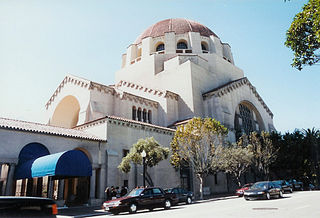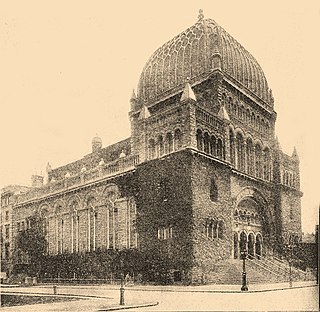Related Research Articles

Congregation Emanu-El of New York is the first Reform Jewish congregation in New York City. It has served as a flagship congregation in the Reform branch of Judaism since its founding in 1845. The congregation uses Temple Emanu-El of New York, one of the largest synagogues in the world.

Temple Beth-El is a Reform synagogue at 5 Old Mill Road in Great Neck, New York. Founded in 1928, it is the oldest synagogue in Great Neck.

Washington Hebrew Congregation (WHC) is a Reform Jewish synagogue in Washington, D.C. Washington Hebrew Congregation is currently a member of the Union for Reform Judaism. It is one of the largest Reform congregations in the United States, with 2,150 members reported on the Union for Reform Judaism database as of 2023.

Congregation Emanu-El of San Francisco, California is one of the two oldest Jewish congregations in California, and one of the largest Jewish congregations in the United States. A member of the Union for Reform Judaism, Congregation Emanu-El is a significant gathering place for the Bay Area Jewish community.

Temple Emanu-El of West Essex in Livingston, New Jersey was founded in 1955 and was one of the earliest Reform synagogues in the West Essex section of New Jersey. Emanu-El means "God is with us" in Hebrew.
Jewish Texans have been a part of the history of Texas since the first European explorers arrived in the region in the 16th century. In 1990, there were around 108,000 adherents to Judaism in Texas. More recent estimates place the number at around 120,000.
Rabbi David Eli Stern is the senior rabbi at Temple Emanu-El of Dallas, the largest synagogue in the South/Southwest United States and the third-largest in the Union for Reform Judaism. He was selected as the 26th most influential rabbi in America by Newsweek magazine in 2008 and the 30th most influential in 2009. Rabbi Stern graduated with high honors from Dartmouth College, earned his M. A. in Jewish education from the Rhea Hirsch School of Education at HUC-JIR Los Angeles, California in 1988, and was ordained from HUC in 1989.
Rabbi Sheldon Zimmerman is a former rabbinic leader in Reform Judaism. He is a past president of the Central Conference of American Rabbis (CCAR) and Hebrew Union College-Jewish Institute of Religion. In 2000, Zimmerman was suspended from the CCAR after an inquiry regarding inappropriate sexual conduct revealed a pattern of predatory behavior, including fondling and kissing a teenager. He subsequently resigned as the 7th president of HUC-JIR which he had led from 1996–2000.

Levi Arthur Olan was an American Reform Jewish rabbi, liberal social activist, author, and professor. Born in Ukraine in 1903, he grew up in Rochester, New York and was ordained at Hebrew Union College in 1929. He served as rabbi of Temple Emanuel in Worcester, Massachusetts from 1929 to 1948, and Temple Emanu-El in Dallas, Texas from 1948 to his retirement in 1970. Olan was one of the most prominent liberal voices in Dallas, which was a predominantly conservative city. His views on poverty, war, civil rights, civil liberties and other topics were disseminated largely through his popular program on WFAA radio, and earned him the moniker, “the conscience of Dallas.” He also had a longstanding visiting professorship at Southern Methodist University and published numerous works on Judaism, process theology, and contemporary social issues.
Dallas is the second-largest city in Texas and has one of the largest Jewish communities in the state.

Temple Beth El, also known as Temple Beth-El, is a Reform synagogue currently located in Bloomfield Township, Michigan, United States. Beth El was founded in 1850 in the city of Detroit, and is the oldest Jewish congregation in Michigan.
Congregation Beth Israel is an egalitarian Conservative synagogue located at 989 West 28th Avenue in Vancouver, British Columbia. It was founded in 1925, but did not formally incorporate until 1932. Its first rabbi was Ben Zion Bokser, hired that year. He was succeeded the following year by Samuel Cass (1933–1941). Other rabbis included David Kogen (1946–1955), Bert Woythaler (1956–1963), and Wilfred Solomon, who served for decades starting in 1964.
Temple B'rith Kodesh is a Reform synagogue in Rochester, New York. It is the oldest synagogue and the largest Reform congregation in the greater Rochester area.
David Lefkowitz, a rabbi, led Temple Emanu-El in Dallas, Texas from 1920 to 1949, after having worked at Temple Israel in Dayton, Ohio. He opposed the rise of the Ku Klux Klan, which had been revived in 1915; it was strongly opposed to immigrants who were Jews and Catholics from eastern and southern Europe. He was a Founding Executive Committee Member of the Dayton Branch of the National Association for the Advancement of Colored People (NAACP).

Temple Emanu-El-Beth Sholom, Westmount is a Reform synagogue in Westmount, Quebec. It is the oldest “Liberal” or “Reform” synagogue in Canada, incorporated on March 30, 1883, and is the only Reform congregation in Quebec.

Temple Israel is a Reform congregation located at 130 Riverside Drive in Dayton, Ohio. Formed in 1850, it incorporated as "Kehillah Kodesh B'nai Yeshurun" in 1854. After meeting in rented quarters, the congregation purchased its first synagogue building, a former Baptist church at 4th and Jefferson, in 1863. Strongly influenced by Rabbi Isaac Mayer Wise, it rapidly modernized its services, and, in 1873, was a founding member of the Union for Reform Judaism.
Stephen Wise Temple is a large Reform Jewish congregation in the Bel Air neighborhood of Los Angeles, California. Founded in 1964 by the late Rabbi Isaiah Zeldin, with 35 families, the congregation grew rapidly. At various times in its history it has been stated to be the largest, or one of the largest, Jewish congregations in the world, at one time having a membership of about 3,000 families, six rabbis, two cantors and two cantorial interns, and four schools on three campuses. As of 1994 it was the second-largest synagogue in the United States. The community was founded as the Stephen S. Wise Temple. In 2014 it was renamed the Stephen Wise Temple.
George Alexander Kohut was an American rabbi and bibliographer; born in Stuhlweissenburg, Hungary.

Temple Beth-El was a Reform congregation and Romanesque synagogue located at Fifth Avenue and 76th Street in the Upper East Side of Manhattan in New York City.
References
- ↑ "HENENBERG, HATTIE L." tshaonline.org. Retrieved 15 September 2015.
- ↑ A Light in the Prairie, Gerry Cristol, TCU Press (1998)
- ↑ Singer, Isidore; George Alexander Kohut; Cyrus Adler. "Kohut, Alexander". Jewish Encyclopedia.
